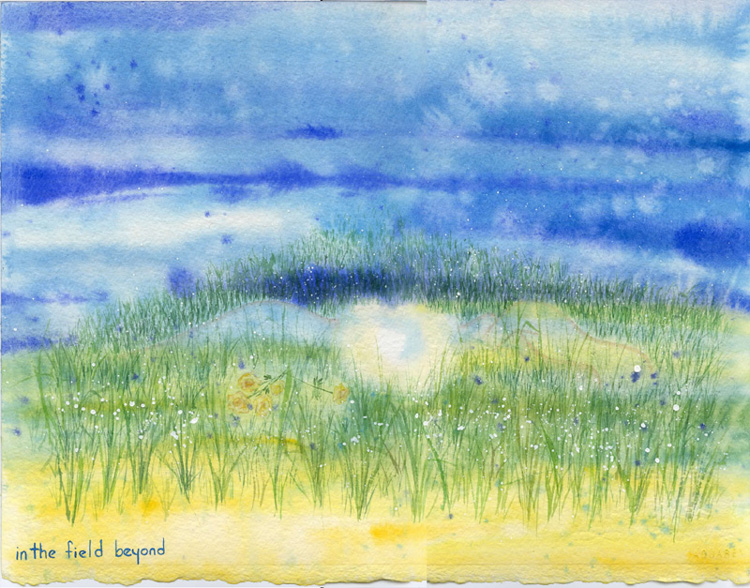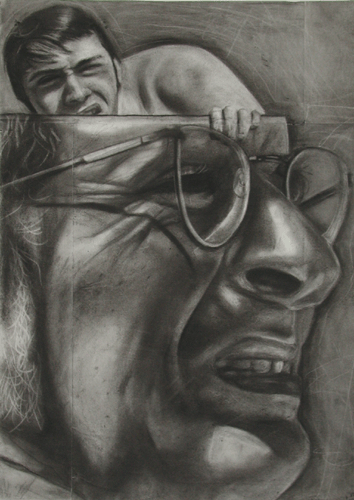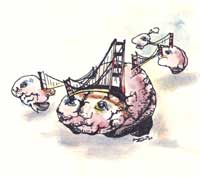
College Seminar I
Bryn Mawr College
Fall 2003
Questions, Intuitions, Revisions:
Telling and Re-Telling Stories About Ourselves In the World
Anne Dalke (English House, ext. 5308, adalke@brynmawr.edu)
Paul Grobstein (Park Science Building, ext. 5098, pgrobste@brynmawr.edu)
Images in this syllabus were created by
--Sharon Burgmayer, Department of Chemistry, Bryn Mawr College:
http://serendipstudio.org/sci_cult/bridges/transformation/revolving2.html
--Janna Stern:
http://serendipstudio.org/exhibitions/stern/
--Rachel Grobstein:
http://serendipstudio.org/exhibitions/rachel

Out beyond ideas of wrongdoing and rightdoing,
there is a field. I’ll meet you there.
Jallaludin Rumi
http://www.khamush.com/life.html
This course was co-designed by faculty members in English and Biology to explore the variety of ways in which we are all continually reaching for new understandings. Materials to be handled in the class include fairy tales, the nineteenth-century satire Flatland, Bertold Brecht's play The Life of Galileo, Thomas Pynchon's novel The Crying of Lot 49 and reflections on topics ranging from linguistics and neurobiology to the culture of Bryn Mawr. In addition to long-established elements of inquiry--acting, enacting, observing, experimenting, reading, talking and writing--we will explore visual culture, the new potentials of the web and other aspects of developing information technology. Together, we will apprehend this wide range of literary, cultural and scientific stories, intuiting, imagining and revising what they might mean, continuously telling and re-telling them in an attempt to "get it less wrong." Students will be expected to contribute to the education of their colleagues as well as to people beyond the College by participating in an on-line forum and putting some of their writing on the web.
 |  |
I. Reading and revising ourselves
The stories we tell ourselves, particularly the silent or
barely audible
ones, "I wrote the story first. It was a true story. But it
seemed too simple.
are very powerful. They become invisible enclosures. Rooms with no air.
One must open the window to see further, the door to possibility….
How to tell a story without fashioning it along the prefabricated
lines? . .
. .
we are immersed in an old story and cannot see what is happening."
Susan Griffin. A Chorus of Stones: The Private Life of War.
New York: Anchor, 1992. 284, 324.
So then I wrote the counter narrative: a second voice, second
thoughts."
Susan Griffin. Reading at Bryn Mawr. February 2, 1999.
9/4
Tracy Chapman. "Telling Stories."
Patricia Hempl. "Memory and Imagination." I Could Tell You Stories. New York: Norton, 1999. 21-37.
Mary Catherine Bateson. Composing a Life. New York: Atlantic Monthly Press, 1989. 1-34, 232-241.
Paul Grobstein. This Isn't Just MY Problem, Friend. http://serendipstudio.org/sci_edu/problem.html
Anne Dalke. "Turtles All The Way down: Class As Persistent Critique." Teaching to Learn/Learning to Teach: Meditations on the Classroom. New York: Peter Lang, 2002. 115-137.
Andrea Friedman. "Meta/phor" and "Sediment Core." http://serendipstudio.org/sci_cult/bridges/friedman.html
Draft A, 4-5pp: compose your own life of learning
Week Two
9/9
Selected excerpts by Charles Darwin, Soren Kierkegaard, Virginia Woolf
from Nothing Begins with N: New Investigations of Freewriting.
Ed. Pat Belanoff, Peter Elbow and Sheryl I. Fontaine.
Carbondale:
Southern Illinois University Press, 1991.
Large group writing workshop on Draft A
9/11
Jakob and Wilhelm Grimm. "Little Briar Rose" and
"Cinderella."
The Complete Grimm's Fairy Tales. Trans. Margaret
Hunt. Revised James Stern. New York: Pantheon, 1972. 118-122,
64-71.
"Yeh-Shen." Myths, Legends and Folktales of America. Ed. David Leeming and Jack Page. New York : Oxford University Press, 1999.
Anne Sexton. Transformations. Boston: Houghton Mifflin, 1971.
Draft B, 4-5 pp: write a fairy tale (maybe re-compose your life of learning as a fairy tale?)
Week Three
9/16
Small group writing workshops on Draft B
9/18
Bruno Bettelheim. "Reflections: The Uses of
Enchantment."The
New Yorker (December 8, 1975): 50-114.
Juana Rodriguez. Guidelines for Revisions.
Paper #1: using Bettelheim's methodology (or another), analyze your fairy tale.
Sunday evening, 9/21: Fairy Tale Symposium
Week Four
9/23
Large group writing workshop on Paper #1
 |
 |
II. Ordering and Re-ordering the World
"Physical concepts are
free creations
of the human mind,
and are not, however it may seem,
uniquely determined by the external world."
--Albert Einstein, in Albert Einstein and
Leopold Infeld.
The Evolution of Physics. New York:
Simon and Schuster,
1938. 33.
9/25
Bertolt Brecht. Galileo. 1952; rpt. New York: Grove, 1966.
Draft A: drawing on Brecht's play, reflect on why we are both motivated and reluctant to revise the stories we tell about the world. What provokes us to this activity? What prevents us from engaging in it? How does it profit us, and what are its costs?
Week Five
9/30
Small group writing workshops on Draft A
10/2
They Might be Giants. "Particle Man."
Edwin Abbott. Flatland: A Romance of Many Dimensions. 1885; rpt. New York: New American Library, 1984.
Richard Monastersky. "Recyling the Universe: New Theory Posits that Time Has No Beginning or End. The Chronicle of Higher Education. June 7, 2002.
Michel Foucault. Preface and Forward. The Order of Things: An Archaeology of the Human Sciences. 1966; rpt. and trans.New York: Vintage, 1973. ix-xxiv.
Draft B: Drawing on Flatland and Foucault, reconsider and revise your reflections about why we (refuse to?) revise the stories we tell about the world.
Week Six
10/7
Large group writing workshop on Draft B
10/9
Steven Johnson. Introduction, "The Myth of the Ant Queen" and "See
What Happens." Emergence: The Connected Lives of Ants, Brains,
Cities, and Software. New York: Simon and Schuster, 2001. 11-67,
227-234.
Daniel Dennett. Chapters 1-3. "Tell Me Why," "An Idea is Born" and "Universal Acid." Darwin's Dangerous Idea: Evolution and the Meaning of Life. New York: Simon and Schuster, 1995. 17-84.
Frank L. Lambert. The Second Law of Thermodynamics! http://www.secondlaw.com/
Paper #2: Drawing on Johnson, Dennett and/or Lambert, revise once again your reflections about why we (refuse to?) revise the stories we tell about the world.
10/14-16 FALL BREAK
Week Seven
10/21
Small group writing workshops on Paper #2
 |
 |
III. Apprehending and Absorbing the Storyteller
"The Brain--is wider than
the Sky--
The Brain is deeper than the sea--
The Brain is just the weight
of God--
Emily Dickinson. 1896; rpt. The Complete Poems.
For--put them side by side--
The one the other will contain
With ease--and You--beside--
For--hold them--Blue
to Blue--
The one the other will absorb--
As Sponges--Buckets--do
For--Heft them--Pound for Pound--
And they will differ--if they do--
As Syllable from Sound"
Ed. Thomas Johnson. Boston: Little, Brown, 1960.
10/23
Michael Polanyi. The Tacit Dimension. New York: Anchor,
1967. 3-25.
George Lakoff and Mark Johnson. "Introduction: Who are We?" "The Cognitive Unconscious," "The Embodied Mind" and "Primary Metaphor and Subjective Experience." Philosophy in the Flesh: The Embodied Mind and Its Challenge to Western Thought. New York: Basic Books, 1999. 3-59.
Draft A: collect data on tacit understanding
Week Eight
10/30
Lev Semenovich Vygotsky. Thought and Language. Trans.
Eugenia Hanfmann and Gertrude Vakar. Cambridge: M.I.T. Press, 1962.
1-7, 119-153.
Steven Pinker. "An Instinct to Acquire an Art," "Chatterboxes" and "Mentalese. The Language Instinct. New York: HarperPerennial,1995. 15-82.
Language: A Conversation. http://serendipstudio.org/local/scisoc/language/
Draft B: interpret the observations you have made
Week Nine
11/4
Large writing group workshop on Draft B
11/6
Oliver Sacks. "The Last Hippie" and "A Surgeon's
Life."An Anthropologist on Mars. New York:
Vintage, 1995. 42-107.
Douglas Hofstadter. Preface and "Six-Part Ricercar." Godel, Escher, Bach: An Eternal Golden Braid. 1979; rpt. New York: Basic, 1999. P1-P23, 720-742.
Paper #4: What new questions does your
explanatory theory raise?
What new experiment need you now design, to elicit a further set
of observations?
Sunday Evening,11/9 Conference on the Unconscious
Week Ten
11/11
Small group writing workshops on Paper #4

|  |
IV. Telling and Re-telling Culture's Story
All that you touch
All that you Change
The only lasting truth
God
Earthseed: The Books of the Living
You Change.
Changes you.
Is Change.
Is Change.
Octavia Butler, Parable of the Sower
11/13
Leslie Marmon Silko. "Language and Literature from a Pueblo Indian
Perspective."Critical Fictions, ed.
Philomena Mariani.
Seattle: Bay Press, 1991. 83-93.
Clifford Geertz."Deep Play: Notes on the Balinese Cockfight."The Interpretation of Cultures: Selected Essays. New York: Basic, 1973. 195-240.
Draft A: Tell the story of some aspect of culture with which you are familiar.
Week Eleven
11/18
Large group writing workshop on Draft A
11/20
Ray McDermott and Herve Vareene. "Culture as
Disability."Anthropology and Education Quarterly 26, 3
(1995): 324-348.
http://serendipstudio.org/sci_cult/culturedisability.html
Lawrence Osborne. "Regional Disturbances."The New York Times. May 6, 2001.
Susan Sontag. Illness as Metaphor and AIDS and Its Metaphors. New York: Anchor Books, 1990. 3-9, 168-183.
Paul Grobstein. Language/Science/Politics 101: War Is a Bad Metaphor. http://serendipstudio.org/sci_cult/war12june03.html
Draft B: Describe the disabling aspects of your culture.
Week Twelve
11/25
Large writing group workshop on Draft B
11/27 THANKSGIVING VACATION
Week Thirteen
12/2
Thomas Pynchon. The Crying of Lot 49. 1965; rpt. New York:
Perennial Classics, 1999.
12/4
Pynchon, continued
Paper #4: What is abling, what dis-abling, about the world Pynchon portrays? What different forms of abling and dis-abling would Oedipa contend with today? Drawing both on the novel and your earlier account of your culture, explore how we might go beyond abling and dis-abling.
 |
 |
V. Re-vising and re-visioning Bryn Mawr
If resistance is always the sign of a counter-story,
ambivalence
Barbara Johnson, The Feminist Difference: Literature, Psychoanalysis, Race,
and Gender.
is perhaps the state of holding on to more than one story at a time."
Cambridge: Harvard University Press, 1998. 2
Week Fourteen
12/9
Helen Horowitz. "A Certain Style of Quaker Lady Dress" and
"Behold They Are Women!" Alma Mater: Design and Experience in
the Women's Colleges from Their Nineteenth-Century Beginnings to the
1930s. New York: Knopf, 1984. 105-133.
The Women of Summer: The Bryn Mawr Summer School for Women Workers, 1921-1938 (videorecording). Dir. Suzanne Bauman. New York: Filmakers Library, 1985. (55 mins.)
Rita Rubinstein Heller. "An 'Unnatural' Institution." "The Women of Summer: The Bryn Mawr Summer School for Women Workers, 1921-1938." Dss. Rutgers University, 1986. 1-36.
Anne Grumman. The Summer School as Seen by a Tutor." Bryn Mawr Alumnae Bulletin 1, 8 (October 1921). 19-23.
Louise Brownell Saunders. "Four Weeks' Experience in the Bryn Mawr Summer School for Labor." Bryn Mawr Alumnae Bulletin. 1, (November 1921).13-16.
"The Future of the Summer School." Bryn Mawr Alumnae Bulletin 1, 9 (November 1921). 17-19.
Hilda Worthington Smith. "The Summer School of 1924." Bryn Mawr Alumnae Bulletin 4 (October 1924). 9-11.
-----. The National Experiment in Adult Education." Bryn Mawr Alumnae Bulletin 13, 9 (December 1933). 8-10.
"Open Letters About the Summer School." Bryn Mawr Alumnae Bulletin 15, 5 (May 1935). 4-8.
Draft A: write the story of Bryn Mawr, as you now understand it.
12/11Anne Dalke, Paul Grobstein and Elizabeth McCormack. Theorizing Interdisciplinarity:Metaphor and Metonymy, Synecdoche and Surprise. http://serendipstudio.org/local/scisoc/DalkeGrobsteinMcCormack.html
Paper #5, to conclude: how might we revise the Bryn Mawr Story? This might take the form of a fairy tale, or a montage, or a poem; it could also be collaboratively written or performed at our
Final Celebration, Sunday evening, 12/14